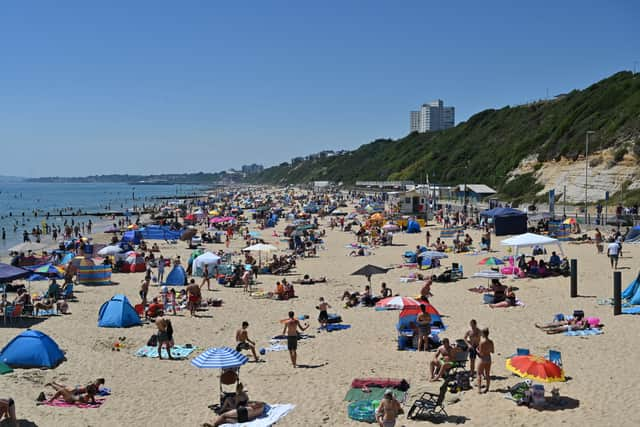Skin cancer rates in UK reach record high as over 17,000 people diagnosed every year, charity warns
and live on Freeview channel 276
Skin cancer rates across all age groups have reached a record high with 17,500 people diagnosed every year in the UK, a leading charity has warned.
Cancer Research UK said the rise in a serious type of skin cancer among older adults has been linked to the boom and popularity of cheap package holidays in the 1960s and the “trends” of having “tanned skin”.
Advertisement
Hide AdAdvertisement
Hide AdThe charity said there has been a particular rise in cases among adults aged 55 and over as cases have increased in this age group by 195% since the 1990s.
Between 1993 and 1995 21.3 people aged 55 and over were diagnosed with melanoma out of every 100,000 with this figure rising to 62.9 cases per 100,000 between 2017 and 2019.
As well as the boom of cheap package holidays and the trends of tanned skin, the charity said other factors have caused the sharp rise in cases among this age group including more people getting their skin checked when they notice changes, and a growing and ageing population.
It warned that across all age groups melanoma skin cancer cases could increase by around 50% over the next 20 years, hitting a record 26,500 a year by 2040.
Advertisement
Hide AdAdvertisement
Hide Ad

Despite the rise in cases, the charity added that deaths from the disease are decreasing due to early diagnosis and treatment.
Cancer Research UK’s chief executive Michelle Mitchell said: “While it’s promising that more people are seeking treatment for skin cancer earlier and survival is improving, it’s alarming that cases of the disease could soar over the coming years.
“Melanoma is the UK’s fifth most common cancer, and we know that 86% of these skin cancers could be prevented.”
She advised the public to “take care in the sun” and “contact your GP if you notice any unusual changes to your skin – it’s not just changes to a mole that matter, it could be a sore that doesn’t heal or any unusual changes to an area of your skin.”
Advertisement
Hide AdAdvertisement
Hide AdShe added: “Spotting cancer early can make all the difference.”
The public are urged to keep an eye on any new moles or a change in an existing mole as it can be a sign of melanoma.
According to the charity, common symptoms of skin cancer include a sore area of skin that doesn’t heal within four weeks, looks unusual, hurts or is itchy or bleeds, crusts or scabs for more than four weeks.
Cancer Research UK’s head of health and patient information Dr Julie Sharp said the best way to protect skin from the sun is to “spend time in the shade especially between 11am and 3pm in the UK” and “remember sunburn doesn’t just happen on the hottest days, you can still get burnt when it’s cloudy.”
Advertisement
Hide AdAdvertisement
Hide AdShe added: “Wearing sunscreen will also help you stay safe in the sun. Make sure you put plenty on and reapply it regularly.”
The warning comes as a yellow heat health alert has been issued for six regions of England including London, Yorkshire, east and west Midlands, and the east and south-east of England as temperatures are set to hit highs of 28C on Friday (7 July) and 30C on Saturday (8 July).
The alert is in place from midday on Friday until 9am on Sunday (9 July).
A yellow warning from the The UK Health Security Agency means there is an increase in risk to the health of individuals over 65 or those who have pre-existing health conditions.
Advertisement
Hide AdAdvertisement
Hide AdDr Agostinho Sousa, head of extreme events and Health Protection at UKHSA, said: “The forecasted high temperatures are expected to be short-lived, but could primarily impact those over the age of 65 or those with pre-existing health conditions.
“If you have friends, family or neighbours who are more vulnerable, it is important to check in on them and ensure they are aware of the forecasts and are following the necessary advice.”
Comment Guidelines
National World encourages reader discussion on our stories. User feedback, insights and back-and-forth exchanges add a rich layer of context to reporting. Please review our Community Guidelines before commenting.
